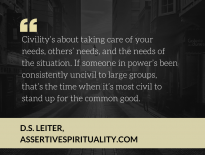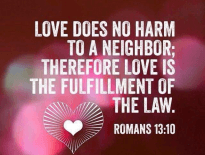Christian Folk, Let’s Stand Up Against Abuse!
We’ve spent a few weeks discussing the toxic patterns that can be enabled by conflict-avoiding “Christian nice” spiritualities and the ways they can make us sick. It’s high time we discuss what healthier spiritual responses to conflict look like. In this post, I’ll outline what I see as an excellent constructive way to approach conflict in abuse situations by jumping off an excellent reflection by Abbot Tryphon, the leader of the All-Merciful Saviour Monastery of the Russian Orthodox Church on Vashon Island, Washington, US.
Abbot Tryphon here specifically addresses situations of domestic violence and abuse within the context of romantic relationships. But I find the spiritual principles he discusses here helpful in assertively addressing a wide range of unhealthy behaviors to allow for a healthier environment, both in and out of domestic environments. (Including issues with refugees and asylum seekers, who are, after all, trying to get away from abusive, violent environments!)
Responding to the Abuser
We are not helping the abuser by being an enabler
There are times when distancing ourselves from someone who is angry, is necessary. There is absolutely no good reason for us to move towards another, when they are being abusive. For the wife of an abuser to remain in danger in an attempt to transfer love, while receiving abuse, could easily be a form of suicide. Too many women, either out of fear, or for economic reasons, or for the sake of the children, remain in abusive relationships. This is clearly a situation that does not require the abused, out of Christian charity, to remain living with the abuser, for to do so could prove dangerous.
It was so good for me to hear these words applied to abuse. I would also argue this applies to situations where people are getting hurt by “Christian Nice,” whether or not the effect is intentional. If you have been hanging out in an environment and find out it’s actually contributing to illness, it’s perfectly okay to remove yourself, whether for a short or long term. Too often spiritual people, including Christians, assume that such removal may come out of some sort of desire for vengeance or retribution, but that may not be so. The temptation to scapegoat people who leave churches or family or friend relationships for these reasons may be strong, but it’s definitely not loving.
If out of a desire to help the abuser we do not call them on their behavior, we could be guilty of enabling their behavior. I once stopped my car at curbside, when I saw a man beating on a woman. It would have been unthinkable for me to continue driving, knowing this woman was in danger. After calling 911, I stepped between the man and woman, telling the man to back off (not something I’d recommend). Lucky for me I was able, probably because of my attire and size, to intimidate him to step back, until the police arrived. My point in telling this story is that there are times when justice must reign, and we must offer assistance to someone who is being abused.
Yes yes yes! Too often we put so much burden on the victim of abuse to forgive (and to do so quickly). This can lead to more trauma for the victim without calling out the abuser. In more seemingly subtle forms of abuse, it’s even more important that the victim should be given validation and the abusers be confronted with the truth–and perhaps not always by the victim. These can be difficult situations in subtle forms of abuse when the person is in deep denial of the ways they are hurting others, but we all need allies to call others out and keep them accountable for not hurting others in similar ways.
Remaining in an abusive relationship can be destructive to our spiritual lives, as well as being potentially dangerous. Yet taking vengeance and striking back, must not be our response, for this avoids the fact that the abuser is in danger, as well, for he must be called to repentance. In our attempt to offer love and goodness to the person who is heaping anger upon us, we could inadvertently be prolonging the day of their repentance. The person struggling with anger does not need us to be his enabler, and relationships of co-dependence have the potential of being spiritually destructive for both parties. As long as our response to someone’s anger is itself devoid of anger, we are safe.
I love this so much. My only caveat is that I’m hesitant about the last sentence. While I encourage us to use mindfulness apps and other healthy ways to manage our emotions before confronting someone, I think anger itself is not the issue. What’s important is that you don’t displace anger onto someone else more than you can help, but going to the other extreme is in danger of leading us back into impossible standards for ourselves and others.
Permissiveness is not required when dealing with the abuser. The opposite of anger is not the permitting of evil to continue, and allowing the offender to remain in a perpetual state of sin. We must respond without anger. Permissiveness is not required when dealing with abuse. The opposite of anger is not the permitting of evil to continue. We must cultivate a strong sense of right and wrong, and the desire to oppose evil, not out of passion, but out of righteousness.
It is also important for me to clearly state that if the anger is accompanied by a history of violence, the gravity of the offense most certainly does not require the abused to continue to live in the grip of the abuser. This can clearly be a situation that requires the abused to remove themselves, and their children, from the dangers of living with such a person.
Again, I would extend this to any situations, whether outwardly violent or not, where someone’s ongoing behavior is causing another person illness. And not just when someone is living with another person, but in any relationship, including with churches. Too often “family values” rhetoric becomes twisted into enabling unhealthy relationships, and that’s not healthy for anyone.
Our Lord drove out the money changers from the Temple, in righteous anger. Likewise, you have the right to defend yourself, your children, and your home, from those who would steal from you, abuse you with insults, or betray your friendship. Such people need not be allowed to remain in your life if their abuse threatens your peace of mind, and the safety of those who are in your charge.
With love in Christ,
Abbot Tryphon
One caveat to this last part: occasionally the wrong people are framed for us as suspicious toward stealing from us, etc. It’s important to make sure our instincts are dead on before acting–but that doesn’t mean we ought not set firm boundaries when we’ve done the required detective work. Thanks, Abbot Tryphon, for showing us a healthier way forward into spiritualities of conflict than “Christian Nice!” May we all work hard to apply these principles.
Related Posts:
- The Toxic Spirituality of “Christian (Midwest Middle Class White People) Nice”
- The Toxicity of “Christian Nice” Part 2: Some Tips to Counter Cordial Hypocrisy
- Swear-Policing Part 2/”Christian Nice” Part 3: The Robert DeNiro Vulgarity Case
- Christian Folk, Please Stop Enabling Human Rights Violations!
- How “Christian Nice” Literally Makes Us Sick
_______
Like this post? Want to continue the conversation? Comment, share it (bar on the bottom), sign up for our email list (in the pull down bar above) and/or stick around and check out our other content!


2 thoughts on “Christian Folk, Let’s Stand Up Against Abuse!”